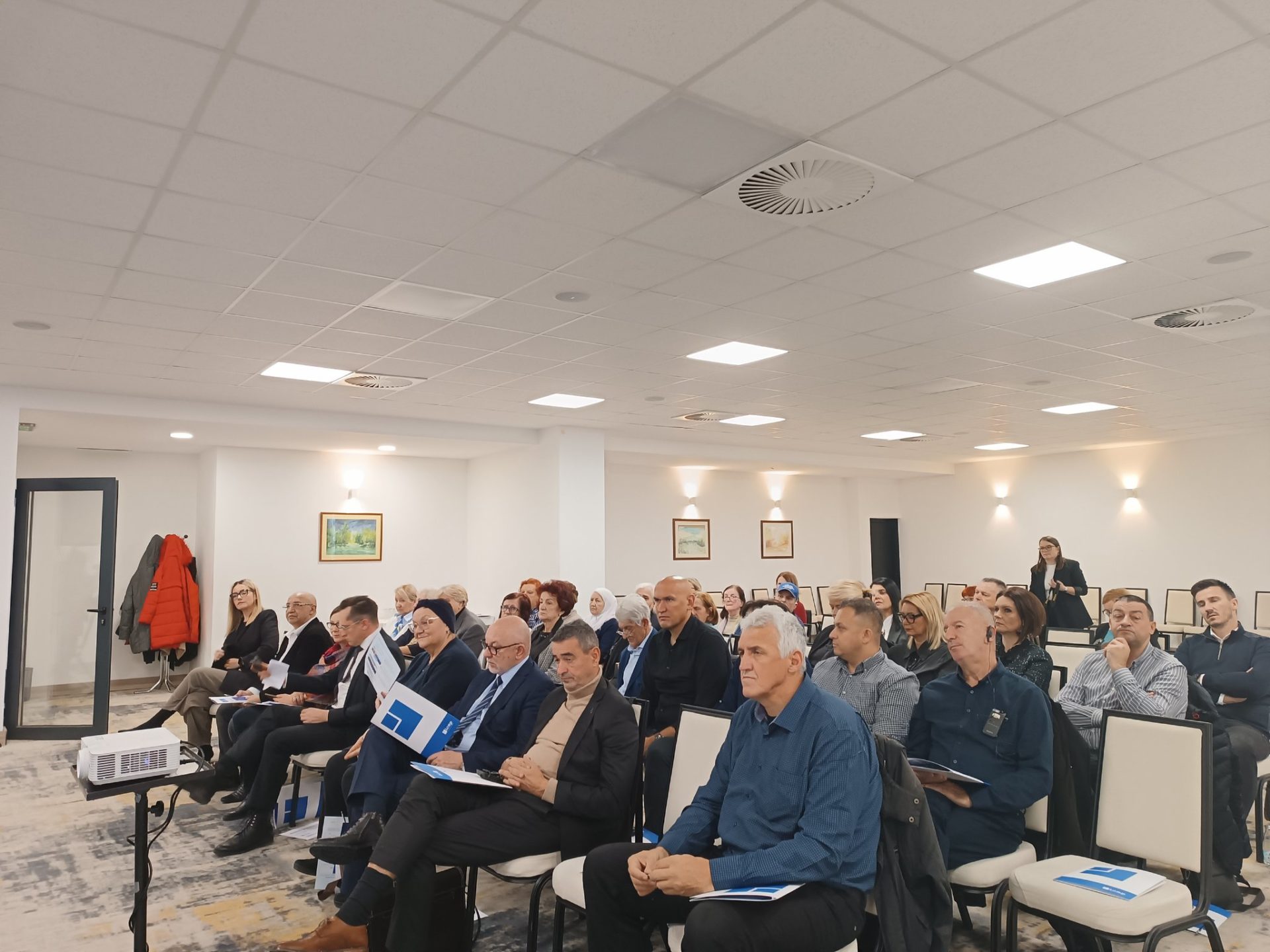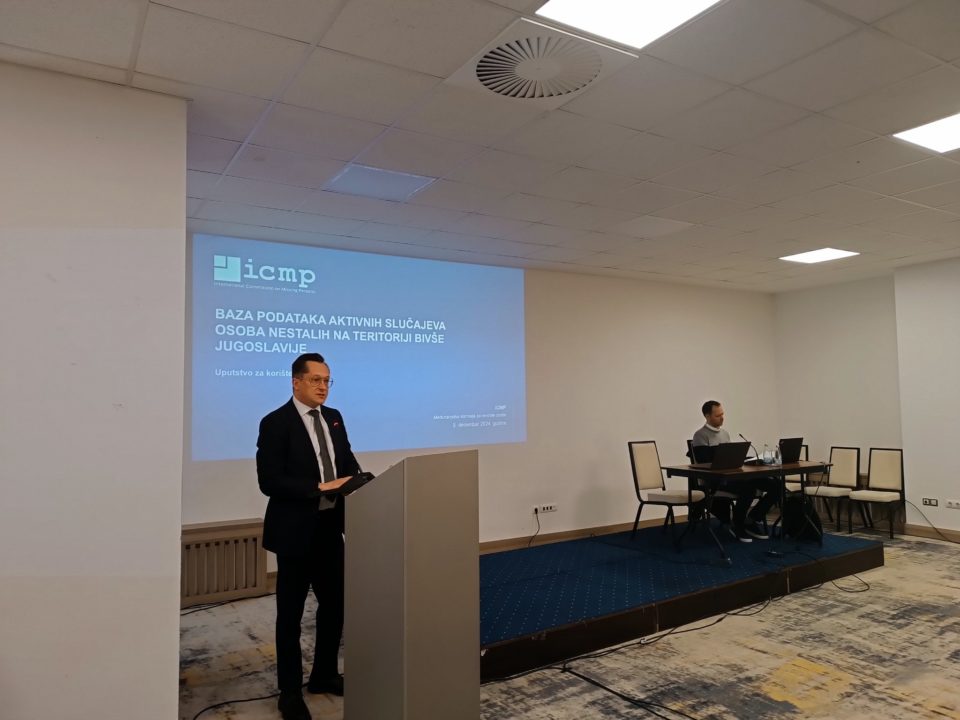
On the International Human Rights Day 2024, the International Commission on Missing Persons (ICMP), with the support of the Government of the United Kingdom, launched the Regional Database of Active Missing Persons Cases from the armed conflicts in the former Yugoslavia. The launch of the database was attended by the families of the missing, the media, and the public.
This is the first transnational, post-conflict database of its kind, enabling the daily exchange of information, verification, and updates between institutions in Bosnia and Herzegovina, Croatia, Serbia, Montenegro, and Kosovo. A portion of the database is accessible to the families of the missing and the broader public, with the aim of contributing to data accuracy and strengthening cooperation in addressing the legacy of the 1990s conflict.
James Hamilton Harding, Deputy Head of Mission at the British Embassy Sarajevo, said that the Government of the United Kingdom, along with the ICMP and other local institutions, has been working for many years to find the remaining 11,000 missing persons in the region.
“The issue of missing persons is primarily a human rights issue, both for families of the missing who have the right to know the fate of their loved ones, but also for society as a whole, in order to find closure,” Harding said.
He explains that the Regional Database demonstrates how post-conflict societies can unite to work together.
“We are here to insist on placing human rights at the forefront, and the finding of the truth is crucial for society as a whole,” added Harding.
The Regional Database was created after the ICMP developed customized software, which was filled with data from local institutions, resulting in a database of all active cases of missing persons in the former Yugoslavia.
Saša Kulukčija, spokesperson for ICMP’s Western Balkans Program, explained that cooperation between the institutions working on missing persons issues in Bosnia and Herzegovina, Croatia, Serbia, Montenegro, and Kosovo was established within the framework of the Berlin Process. Where there are still poor bilateral relations, the Database allows for real-time access to all information, as well as the ability to nominate new cases or close those that have been resolved.
“Families of the missing can add new data to the Database if they have it or check the already entered data through a notification system. Then, institutions receive an alert that something has changed, which they then verify,” said Kulukčija. He added that the Database serves to harmonize all data and allows everyone to verify the information.
Bosnia and Herzegovina has the largest number of missing persons of any country in the region. Therefore, Saliha Đuderija, ICMP Board of Directors Chairwoman in Bosnia and Herzegovina, stated that there is significant interest in searching for the missing on a regional basis.

“We have been cooperating regionally for several years, exchanging data with colleagues from Serbia, Montenegro, Croatia, and Kosovo, to identify individuals from Bosnia and Herzegovina who went missing in other countries’ territories,” said Đuderija.
She gave the example of a Bosnian citizen who went missing in Croatia and, through joint cooperation and the Database, was identified and buried in Bosnia and Herzegovina.
“In the database regarding Bosnia and Herzegovina, there are 108 individuals for whom we have indicative data that they went missing in the territories of the former Yugoslavia. The largest number went missing in Serbia, some in Croatia and Montenegro, one in Slovenia, and one in North Macedonia, as some information showed later,” said Đuderija.
She also mentioned that there are more missing persons from Croatia and Serbia who lived in Bosnia and Herzegovina or were members of military groups and were killed there.
“It is important to note that if there is a match in blood samples done by the ICMP, and the individual is found in our database or Croatia’s database, the case is added to the regional database and jointly worked on,” added Đuderija.
The Regional Database can be searched by name, father’s name, surname, and the reported area of disappearance. During the launch of the regional database, representatives of the families of the missing persons from Bosnia and Herzegovina agreed that it is good that the database exists, but that it should include more detailed information, such as the municipality from which the person was taken, whether they were a civilian or a soldier, their personal identification number, and similar details.
ICMP representatives stated that they will consider adding the municipality from which the person disappeared, but that personal identification numbers are protected by the Personal Data Protection Law and thus unavailable.
More than 40,000 people went missing during the armed conflicts of the 1990s in the former Yugoslavia. Domestic institutions responsible for addressing the issue of missing persons in Bosnia and Herzegovina, Croatia, Kosovo, Montenegro, and Serbia are members of the Missing Persons Group, and each has established its own official records of missing persons. These records were created based on direct reports from the relatives of the missing or based on cases documented by state institutions, non-governmental organizations, or international organizations involved in data collection.
Challenges arose in maintaining accurate records. It often happened that individuals with residence in one territory went missing in another, while many families were displaced and now live in other countries. To establish an accurate database, it was necessary to consolidate, harmonize, and verify data across national borders. This led to the creation of the joint Database of Active Cases of Missing Persons due to the armed conflicts in the former Yugoslavia.





